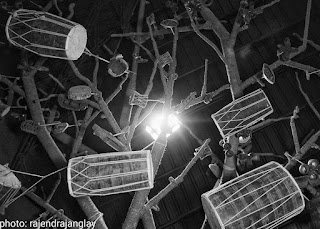Even a hurried tour of the affected areas is enough to bring home the sharp misery that has resulted from excessive rainfall for two successive years.
Although the entire tribe is passing through a slow-death process due to chronic malnutrition, the situation is particularly alarming in eight blocks- Littipara, Amarapara, Sundar Pahari, Boarijore, Boria, Barahat, Pothna and Taljhiri -- inhabited by 75,000 people.
Isolated
Although Government sources have described the opposition allegation of 43 starvation deaths as "baseless, totally false and politically motivated", the situation is bad. Batches of hungry, ill-nourished Paharias, who seldom leave the hills, have come down to the plains and are seen roaming in search of food.
In front of restaurants in Godda, Pakur, Amarapara and Hiranpur towns, squat scores of starving men, women and children all day to share the food with the stray dogs.
Their way of life
Paharias live today as they have lived for centuries. It also contributes much to their pitiable condition. The tribe generally avoids civilisation and prefers to live on remote hilltops in complete isolation, perhaps to their doom.
Once a week they come down to nearby towns to sell faggots, roots, tubers and fruits that they collect from the jungles, and to buy basic consumer goods for their homes.
Their general isolation makes them suspicious not only of the 'dikkus' ('plains' people') but also of the tribal Santhals.
They refuse to adopt improved methods of agriculture and grow maize and Ghanghara through the method of shifting cultivation, which demands more time, space and labour and results in unnecessary wastage of much-needed forest wealth.
Their main food, however, comes from wild fruit like Mahua, roots, tubers etc. No Government has ever taken the trouble to get them to change their wasteful way of living and to induce them to join the State's mainstream of life.
Primitive
In these circumstances, Paharias continue to live a deprived and insecure life. Economic hardships directly affect their life. Many are afflicted by TB and leprosy.
There is hardly any medical facility worth the name. The few so-called health centres that have been opened as show-pieces are virtually inoperative, and either have no doctors or no proper medicines. Education is practically non-existent and even matriculates among Paharias are very rare.
Even drinking water is considered a luxury in most villages. Some villagers fetch water from anywhere like three miles away.
Last year's excessive and untimely rains ruined the Paharia's Bhadai crop altogether. Rabi is never grown in the tribal areas of the district.
Even Mahua, which yields food as well as beverage, was not available on the trees this year. After two such years, the Paharia's plight is imaginable.
According to Government sources, relief measures have already been taken up: free rations are being distributed.
Other relief measures such as loans, subsidies and manual labour schemes to give the Paharias purchasing power have been started. Fair price shops have been opened on the hills and orders issued to district officials that whatever forest produce the Paharis brought should be officially purchased.
Feudal System
However, temporary relief is no solution in such a situation the roots of which lie deep in feudal exploitation.
As early as 1880, the Famine Commission had said that the sad plight of the people of Bihar was due to the defective agrarian system "Though the rent law gave the ryot certain rights, he was so helpless or so ignorant that he was unable to assert these rights out of court, or to go into court to assert them."
For all practical purposes, the structure is as it was nearly a hundred years ago not only in the Santhal Parganas but in the entire Tribal belt of Chotanagpur, including Ranchi, Palamu, Hazaribagh, Dhanbad and Singhbhum.
Land reform, irrigation, and better agricultural practices have never touched the five-million-odd Adivasis of the State.
They have been systematically exploited by money-lenders. It is a fact that the Tribals have lost more land under the Indian Government than during the British regime.
The welfare departments have turned out to be self-help departments.
Although the purchase of Adivasi land by non-Adivasis is illegal under the Chotanagpur Tenancy Act, thousands of acres had in fact been acquired by speculators, many of them political leaders and Government officers, by devious means for only a fraction of their real value.
Misery, poverty, unemployment and illiteracy are the byproducts of the feudal struc- ture headed by money-lenders in the region. The plight of Paharias should be treated as a warning signal in this regard.
How long will the Paharias continue to sing:
O, my beloved you have gone far away
You have gone very far away indeed.
Where shall we meet,
Where shall we see each other? When the HANSA JATRA (fair)
will be held
We will meet each other.
When the BAMINI fair will be held
We will see each other again. If I meet you in the HANSA JATRA, I will give you a ring.
If I meet you in the BAMINI fair,
I will give you a garland. I will give you a ring and then we will talk.
i will put the garland on your neck
And then we will talk and laugh.




Comments
Post a Comment
Thanks for your comment. It will be published shortly by the Editor.